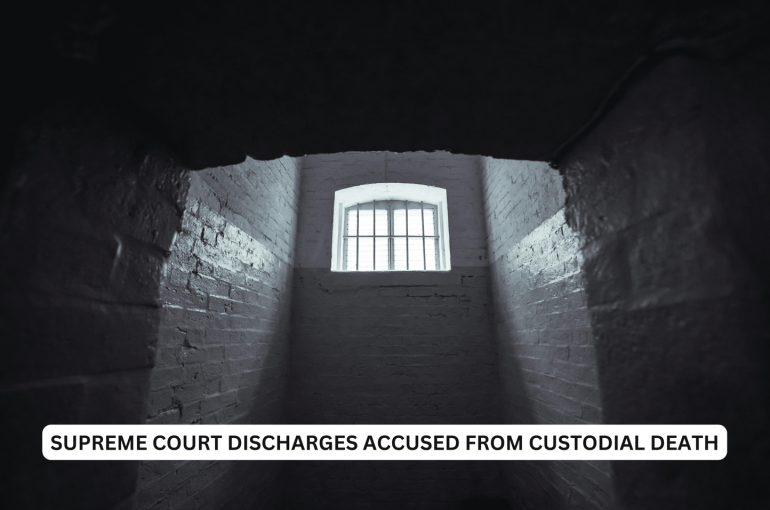SUPREME COURT DISCHARGES ACCUSED FROM CUSTODIAL DEATH
Introduction:
In the present case of the Ram Prakash Chadha v. The State of Uttar Pradesh [Criminal Appeal No. 2395 of 2023 (@ SLP (Crl.) No. 6687 of 2023] the Hon’ble Supreme Court of India stated that if an Application for Discharge under section 227 of the Code of Criminal Procedure, 1973 (CrPC) is being dismissed on the grounds of suspicion, such suspicion should be backed by the material on record and should not be based on presumptions.
The Hon’ble Supreme Court further stated that in such matters the concerned court is bound to disclose the reasons while rejecting any such Application, which will aid the superior court to determine the grounds for rejection of such Application for Discharge.
Facts leading to the Case:
Ram Kishore and Pappu Yadav are cashier and accountant for the businessman Ram-Prakash Chaddha, who is the Appellant herein. They went for cash collection from the business proceeds of the shops at Meerut and Modi Nagar in Ghaziabad.
They stopped at one shop wherein Ram Kishore went to the said shop while Pappu Yadav waited for him in the car with a bag containing the collected cash and documents. Then out of nowhere 2 people came and at gun point threatened Pappu Yadav and then snatched the bag and fled the crime scene.
The Appellant was informed about the said robbery over call and later on he registered an FIR under section 392 of the Indian Penal Code, 1860 (IPC) at Modi Nagar Ghaziabad Police Station (hereafter referred to as “Police Station”). The supervising officer of the case stopped the closure report and handed over the case for investigation to another officer.
After a couple of days, the Appellant from his residence made a call to Ram Kishore through one of his other employees and took him to the Police Station for further inquiry.
Case Background:
As per the chargesheet filed by the Crime Branch, Crime Investigation Department (CBCID), Ram Kishore was in the illegal custody from 17.07.1993 to 23.07.1993. He was subjected to torture during the investigation and on the night of 23.07.1993 he was admitted to the hospital as “unknown person” wherein he was declared dead at 3.20 AM in the morning. A complaint was filed regarding the custodial death of the deceased.
The investigating Police Officers along with the Appellant were made accused in the chargesheet for the offences charged under sections 302, 343, 217, 218, 330, 120B and 34 IPC. The charges filed against the accused were under Section 120B and 34 of IPC
The Appellant then approached the Court of Additional Sessions Judge/Special Judge (CBI), Ghaziabad and filed an Application for Discharge contending absence of any ground to proceed against him and therefore seeking discharge under section 227 of CrPC. The same was rejected. Thereafter, a Petition under section 482 of CrPC was filed in the High Court of Allahabad against the said Order of Dismissal
The Appellant then approached the Hon’ble Supreme Court of India under Criminal Appellate Jurisdiction challenging the afore-mentioned dismissal of the said Application.
Observations made by the Hon’ble Supreme Court:
The state argued that the Appellant had made the complaint in the Police Station in order to get the robbery crime registered. It was argued that the Appellant intentionally brought the deceased to the Police Station. This they argued was the reason for dismissal of the Application for Discharge by the High Court of Allahabad.
The Hon’ble Supreme Court observed that strong suspicion can be a ground for dismissal if the emerging facts are not brought on record by the prosecution and is not based on supposition, suspicious and conjectures. The Hon’ble Court further directed that in such matters the reasons for rejection of such applications for discharge should be stated clearly in order to assist the higher court for identifying a prima-facie case.
Decision:
Upon findings, the Hon’ble Supreme Court of India concluded that the evidence and the material on record presented in no way points out any co-relation of the Appellant with the death of the deceased Ram Kishore.
The decision of the Hon’ble Supreme Court of India was revolving around the issue, ‘the record of the case and the documents submitted therewith’, for which the court referred to the decision of Madhya Pradesh High Court in the case of Kaushalya Devi v. State of MP [92003 SCC OnLine MP 672] it was held that if there is no legal evidence, then framing of charge would be groundless and compelling the accused to face the trial is against the fundamentals of Article 21 of the Constitution of India.
The Hon’ble Supreme Court of India allowed the present Appeal and set aside the impugned Order passed by the High Court of Judicature at Allahabad and the Order passed by the Additional Sessions Judge/Special Judge (CBI).
Ashita
Associate
The Indian Lawyer and Allied Services
Sushila Ram Varma
Advocate & Editor





































Leave a Reply